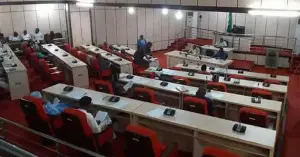The Federal Government conducted nationwide entrance examinations on Saturday for approximately 30,000 students seeking admission into Federal Technical Colleges through its Technical and Vocational Education and Training (TVET) initiative.
The examination, administered by the National Business and Technical Examinations Board (NABTEB), aims to identify and select students who will benefit from the government's comprehensive technical education program.
Benefits for Successful Candidates
Students who pass the examination will receive free tuition, accommodation, and feeding at Federal and State Technical Colleges. The TVET initiative is designed to equip participants with industry-relevant skills while reshaping Nigeria's approach to human capital development.
Dr. Mohammed Aminu Mohammed, Registrar and Chief Executive Officer of NABTEB, told reporters after monitoring the examination at Federal Technical College, Orozo, Abuja, that results would be released within 21 days.
"If you pass, we will look at your skill and study your score. We have already collected certain data from each candidate, and that will help us determine whether they are suited for electrical installation, tailoring, solar maintenance, or other vocational areas," Mohammed explained.
Strategic Approach to Skills Development
The NABTEB chief emphasized that the examination serves as more than just a selection tool—it strategically determines individual strengths and aligns them with specific trades. He highlighted the program's potential to reverse Nigeria's overdependence on imported skills and products.
"No nation succeeds economically without artisans, craftsmen, and technicians. They are the backbone of any country's gross domestic product (GDP)," Mohammed stated. "In Nigeria, we depend so much on paper qualification. That era of paper qualifications is gone. We are now in the era of 'what can you offer or do to add to our GDP?'"
A selection committee comprising principals of federal technical colleges, NABTEB officials, and representatives from the Ministry of Education will oversee the admission process. Mohammed also mentioned plans to digitize the entire process by next year.
Training Duration and Support
The TVET program will offer training of varying durations—six months, nine months, or one year—depending on students' chosen trades. Upon completion, graduates will receive starter packs and possible access to business loans.
"This is not just about skills acquisition. It's about job creation and economic empowerment. Those who complete the programme can either be employed by the government or set up their own businesses with the support structures being put in place," Mohammed added.
He lamented the current trend where simple construction jobs like tiling and POP installations are outsourced to foreign nationals, despite Nigerian youth having the potential to perform these tasks if properly trained and certified.
"This reawakening is to ensure that Nigeria becomes a production country. We bring fillers from Togo and even our POP we bring the people from Benin Republic and we have many youths here that can do these jobs to earn a living," he noted.
The government plans to create an enabling environment for certified technical talents to practice locally, with major national projects like the gas pipeline initiative expected to rely heavily on indigenous artisans and technicians.
"Certification builds trust. No one wants to risk their resources on unverified skills," Mohammed concluded.
Stay updated with the latest news! Follow BenriNews on social media:













